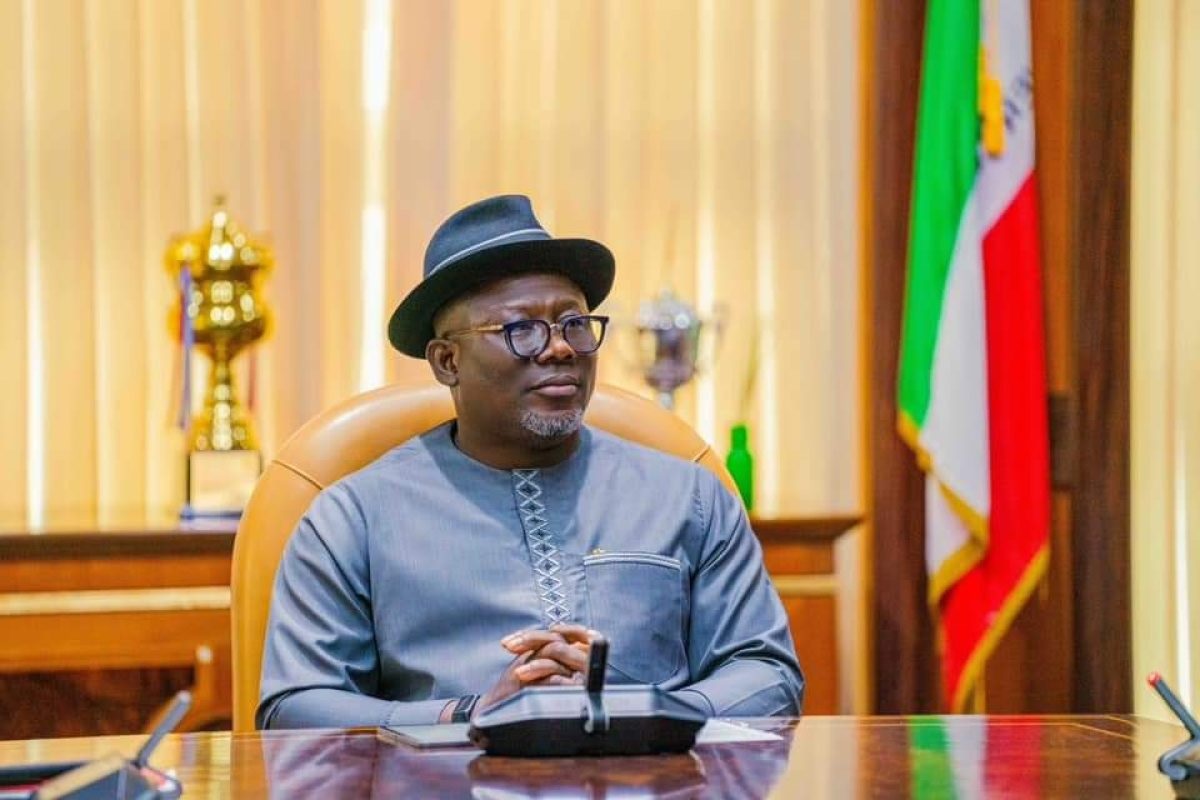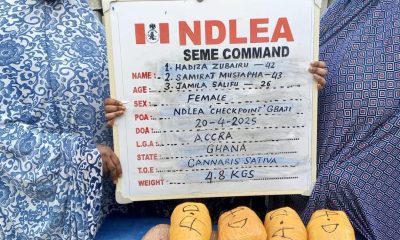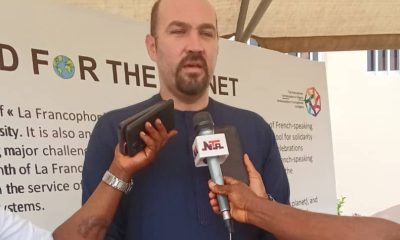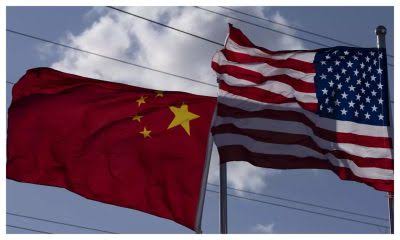News
Trump Launches ‘Reciprocal Tariffs’ Targeting Allies, Adversaries

US President Donald Trump inked plans Thursday for sweeping “reciprocal tariffs” hitting both allies and competitors, in a dramatic escalation of an international trade war that economists warn could fuel inflation at home.
Speaking in the Oval Office, Trump said he had decided to impose the reciprocal duties, telling reporters that US allies were often “worse than our enemies” on trade issues.
The levies would be tailored to each US trading partner and consider non-tariff factors including value-added tax (VAT).
“Major exporting nations of the world attack our markets with punishing tariffs and even more punishing non-tariff barriers,” Trump trade advisor Peter Navarro told reporters, taking aim at the European Union in particular over VAT.
Washington will start by examining economies with which the United States has its biggest deficits or “most egregious issues,” said a White House official.
“This should be a matter of weeks, in a few months, but not much longer than that,” the official added, speaking on condition of anonymity.
Trump acknowledged Thursday that US prices “could go up” due to tariffs, but he expressed confidence that they would ultimately ease.
Trump has announced a broad range of tariffs targeting some of the biggest US trading partners since taking office, arguing that they would help tackle unfair practices — and in some cases using the threats to influence policy.
The president has referred to tariffs as a way to raise revenue, remedy trade imbalances, and pressure countries to act on US concerns.
The White House official said Thursday that the United States has been “treated unfairly,” saying a lack of reciprocity is a reason behind the country’s “persistent annual trade deficit in goods.”
With the memo Trump signed on Thursday, the US Trade Representative, commerce secretary and other officials will work to propose remedies on a country-by-country basis.
Trump’s announcement came hours before he was due to meet Indian Prime Minister Narendra Modi in Washington.
Analysts have warned that reciprocal duties could bring a broad tariff hike to emerging market economies such as India and Thailand, which tend to have higher effective tariff rates on US products.
Countries such as South Korea that have trade deals with Washington are less at risk from this move, analysts believe.
Inflation concerns
Cost-of-living pressures were a key issue in the November election that saw Trump sweep to power, and the Republican has promised to swiftly reduce prices.
But economists caution that sweeping tariffs on US imports would likely boost inflation, not reduce it, in the near term and could weigh on growth eventually.
Trump’s deputy chief of staff for policy Stephen Miller previously said countries use the VAT to get an unfair trade advantage, although analysts have challenged this characterization.
During election campaigning, Trump promised: “An eye for an eye, a tariff for a tariff, same exact amount.”
For example, if India imposes a 25-percent tariff on US autos, Washington will have a 25-percent tariff as well on imports of autos from India, explained a Nomura report this week.
The consideration of non-tariff factors might shift this calculus.
Modi will hold talks with Trump on Thursday and New Delhi offered some quick tariff concessions ahead of his visit, including on high-end motorcycles.
“Trump’s objective of implementing reciprocal tariffs is to ensure fair treatment for US exports, which could indirectly also address US trade imbalances with partner countries,” analysts at Nomura said.
Among Asian economies, India has a 9.5-percent weighted average effective tariff on US exports, while there is a three-percent rate on India’s exports to the United States.
Thailand has a 6.2-percent rate and China a 7.1-percent rate on US products, Nomura noted.
Higher tariffs are often imposed by poorer countries, who use them as a tool for revenue and protection because they have fewer resources to impose non-tariff barriers, Cato Institute’s Scott Lincicome earlier told AFP.
AFP
News
UNUSUAL! Without invitation, Police declared me wanted — Daughter of ABC Transport owner

Ihuoma Julia Nneji, 34, daughter of the owner of ABC Transport, claimed over the weekend that she was declared wanted by the police without any prior invitation or notification of a petition against her.
She was recently listed in a Special Police Gazette Bulletin issued by the Nigeria Police Force National Cybercrime Centre (NPF NCCC), Abuja, for criminal defamation, injurious falsehood, and cyberstalking.
In a statement, she insisted she never defamed or blackmailed anyone on her verified social media pages or elsewhere.
Instead, she claimed she is the victim of blackmail and threats from her former boyfriend, Henry Uzochukwu, the complainant in the case.According to her: “I met Henry Uzochukwu in April 2024, and we started getting to know each other. Unfortunately, things didn’t go as planned”.
“This conflict began in August 2024 when I called off our wedding, scheduled for November 2024, due to unresolved issues regarding Henry’s sexuality. I found incriminating evidence suggesting he is gay and decided not to proceed with the marriage.
“Further investigations revealed not only his interest in men but also that he had been engaged multiple times without disclosing the reasons for the failed marriages. I discovered that the woman he was to marry before me left him a week before the wedding over the same issue.
“I was deceived and manipulated by the many lies he told.
“After I canceled the wedding, he began to harass me, threatened my life, and falsely accused me of operating an Instagram page spreading rumors about him — a claim that is speculative and untrue.”
News
Just in: EFCC Uncovers N1bn in Jewelry, Cash at Aisha Achimugu’s Home as Hunt for Missing $250m Gathers Momentum

The Economic and Financial Crimes Commission (EFCC) has intensified its investigation into a massive financial scandal involving businesswoman Aisha Achimugu Sulaiman, after discovering luxury items and large sums of cash in her Abuja residence linked to a missing $250 million.
Acting on a court warrant, EFCC operatives stormed Achimugu’s home at No. 61 Hassan Usman Katsina Street, where they uncovered a staggering haul: N30 million in cash, $50,000 in foreign currency, and boxes containing gold, diamond, and silver jewelry valued at over N1 billion. The discovery is part of a broader investigation into alleged money laundering and misappropriation of political campaign funds.
Sources close to the investigation revealed that the $250 million in question was reportedly entrusted to Achimugu by Lagos State Governor Babajide Sanwo-Olu as part of his 2027 campaign preparations. Insiders claim the funds were meant for safekeeping but were allegedly moved across multiple accounts and may have been squandered.
“The issue is deeper than most people know. Sanwo-Olu put himself in a mess when he went and kept that $250 million in an account belonging to Aisha. Aisha has messed with the funds and cannot account for it anymore,” a source familiar with the case disclosed.
The EFCC has reportedly frozen 136 bank accounts linked to Achimugu across ten banks. Investigators also discovered she operates over 20 companies registered with nearly identical addresses—suggesting a network of shell corporations possibly used to move funds.
Achimugu, currently believed to be in London, was summoned by the EFCC to appear at its Port Harcourt office on March 25, 2025. She has since failed to show up and is now officially wanted by the anti-graft agency.
Details shortly…
News
Gov Oborevwori’s top aide suddenly resigns from govt

In a shocking political move, Harrison Gwamnishu, Senior Special Assistant (SSA) to the Delta State Governor on Civil Society and Youth Mobilization, has tendered his resignation, citing deep dissatisfaction with the government’s handling of escalating insecurity across communities in the state. Gwamnishu submitted his resignation letter on Friday, April 25, 2025, addressed to Governor Sheriff Oborevwori, Executive Governor of Delta State. He emphasized that his decision followed “considerable reflection” and was driven by a “deep sense of disappointment” over the administration’s failure to act on security concerns he consistently raised.
In his letter, Gwamnishu detailed his efforts to draw the government’s attention to the worsening security situation, including numerous messages, calls, and submission of blueprint documents proposing actionable solutions.
However, he lamented that all attempts were “thrown out,” and meaningful solutions were “not being accepted” by the administration.
“As a civil rights leader, I accepted this appointment as a commitment to serve and protect our community,” Gwamnishu wrote. “However, the continuous escalation of insecurity and the persistent lack of action to provide effective resolutions have rendered me unable to fulfil my duties with the integrity and effectiveness that I believe are essential.” He further stated that his resignation is intended to serve as a wake-up call to the administration, urging it to prioritize the safety and security of Delta State citizens.
-

 News20 hours ago
News20 hours agoGunmen abduct two senior LG workers, three others
-

 News5 hours ago
News5 hours agoJust in: Senator Natasha tenders satirical ‘apology’ to Akpabio
-

 News22 hours ago
News22 hours agoNDLEA storms Lagos hotel, recovers N1.042billion illicit drug consignments(Photos)
-

 News21 hours ago
News21 hours agoArmy Chief condemns beating, harassing civilians in military uniform says, it’s wrong
-

 News14 hours ago
News14 hours agoBenue LG chairman gives Fulanis 48hrs to leave all farmlands
-

 News19 hours ago
News19 hours agoFrancophone Ambassadors, Nigeria Unite To Fight Against Climate Change
-

 News14 hours ago
News14 hours agoFive suspected kidnappers eliminated by police in Delta
-

 Metro6 hours ago
Metro6 hours ago‘My husband always makes love throughout the night until morning’ – Woman Wants Divorce

















